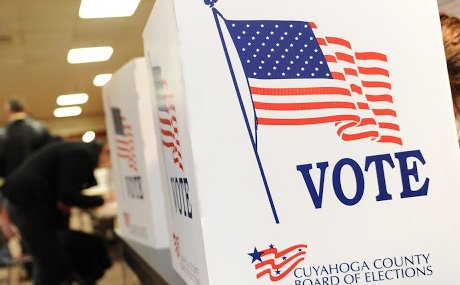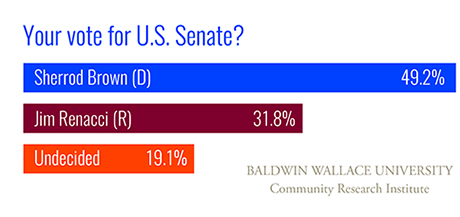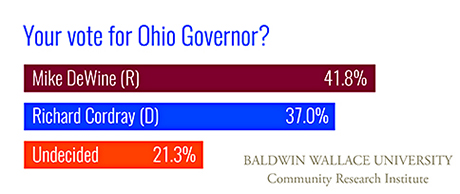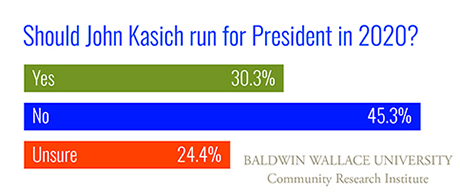Baldwin Wallace University poll shows voter enthusiasm gap in advance of Ohio midterm election
 A
Baldwin
Wallace
University
survey
reveals
that
a
strong
majority
of
likely
Ohio
voters
have
magnified
the
significance
of
the
2018
midterm
elections,
with
nearly
58%
saying
that
voting
this
November
is
more
important
than
in
previous
midterms.
A
Baldwin
Wallace
University
survey
reveals
that
a
strong
majority
of
likely
Ohio
voters
have
magnified
the
significance
of
the
2018
midterm
elections,
with
nearly
58%
saying
that
voting
this
November
is
more
important
than
in
previous
midterms.
The results also point to an enthusiasm gap that could benefit Democratic candidates; about 67% of Democrats believe voting in this midterm election is more important compared to about 53% of Republicans.
The poll, conducted by BW's Community Research Institute (CRI) September 5-15, also shows the incumbent Democratic U.S. Senator Sherrod Brown and Republican candidate for governor, Mike DeWine, both leading their respective races. In both races, however, large groups of "undecided" voters could determine the outcomes.
U.S. Senate and Gubernatorial Races
 In
the
contest
for
U.S.
Senate,
the
survey
shows
Brown
with
a
49%
to
32%
lead
over
his
Republican
challenger
Jim
Renacci.
About
19%
remain
undecided
with
seven
weeks
until
the
election.
In
the
contest
for
U.S.
Senate,
the
survey
shows
Brown
with
a
49%
to
32%
lead
over
his
Republican
challenger
Jim
Renacci.
About
19%
remain
undecided
with
seven
weeks
until
the
election.
In the Governor's race, DeWine holds a 42% to 37% advantage over Democrat Richard Cordray among voters stating a preference, making the race a statistical tie. More than 20% say they remain unsure about how they will vote for governor.
 "In
both
races,
the
outcomes
will
hinge
on
how
late-deciding
voters
break
on
election
day,"
said
Dr.
Tom
Sutton,
director
of
the
Community
Research
Institute.
"Both
Cordray
and
Renacci
are
still
far
less
known
to
Ohio
voters,
with
nearly
half
of
those
surveyed
saying
they
haven't
heard
enough
about
either
candidate
to
form
a
favorable
or
unfavorable
opinion.
Just
one
in
five
voters
don't
yet
know
enough
about
DeWine
or
Brown.
"In
both
races,
the
outcomes
will
hinge
on
how
late-deciding
voters
break
on
election
day,"
said
Dr.
Tom
Sutton,
director
of
the
Community
Research
Institute.
"Both
Cordray
and
Renacci
are
still
far
less
known
to
Ohio
voters,
with
nearly
half
of
those
surveyed
saying
they
haven't
heard
enough
about
either
candidate
to
form
a
favorable
or
unfavorable
opinion.
Just
one
in
five
voters
don't
yet
know
enough
about
DeWine
or
Brown.
"As a result, the frontrunners in each race have both higher favorable and unfavorable ratings already established among the electorate, but also have an opportunity to help define their less well-known opponents," added Sutton.
Ranking the issues
The survey also asked likely voters from all five regions of this bellwether state to rank the issues most important to them in the races for governor and U.S. Senate. Health care came out on top, followed by the economy, taxes, gun policy, immigration, abortion and trade.
"With health care top of mind, another interesting result is that about 70% of Ohio voters voiced approval for Ohio Republican Governor John Kasich's expansion of Medicaid health care coverage despite opposition within his own party," said Dr. Lauren Copeland, associate director of the CRI.
Discouraging a Kasich challenge
 "At
the
same
time,
we
found
tepid
support
for
Kasich
mounting
a
primary
challenge
to
President
Trump
in
2020,"
Copeland
added.
"Just
30%
would
like
to
see
the
outgoing
governor
get
into
the
race,
with
about
45%
saying
they
would
not
like
to
see
Kasich
run."
"At
the
same
time,
we
found
tepid
support
for
Kasich
mounting
a
primary
challenge
to
President
Trump
in
2020,"
Copeland
added.
"Just
30%
would
like
to
see
the
outgoing
governor
get
into
the
race,
with
about
45%
saying
they
would
not
like
to
see
Kasich
run."
According to Copeland, "This is consistent with previous polls we've conducted, but it's interesting in light of Governor Kasich's and President Trump's respective job approval ratings. Although a majority of Ohio Democrats (50%) and Republicans (53%) support Kasich, Trump's support breaks squarely along party lines (9% Democrats, 81% Republicans)."
Survey respondents also expressed opinions on how the Trump administration has handled a number of issues from tax cuts (50% approve, 38% disapprove) to trade tariffs (44% disapprove, 42% approve) to immigration (equally divided at 47% approve and disapprove).
A clear majority of Ohioans approve of the Mueller investigation into Russian meddling in the 2016 election (53% approve, 34% disapprove).
Trump's Tweeting and Trust
 There
is
widespread
agreement
among
survey
respondents
that
President
Trump
uses
his
personal
Twitter
handle
"too
much"
(70%).
In
addition,
a
supermajority
(62%)
believe
that
the
president's
use
of
Twitter
is
"inappropriate."
There
is
widespread
agreement
among
survey
respondents
that
President
Trump
uses
his
personal
Twitter
handle
"too
much"
(70%).
In
addition,
a
supermajority
(62%)
believe
that
the
president's
use
of
Twitter
is
"inappropriate."
Nevertheless, Ohioans are divided as to whether they trust President Trump or the news media to tell "the truth about important issues." Whereas 29% trust President Trump more, about 37% trust the news media more. The differences are stark among party lines, with 64% of Democrats trusting the media more and 59% of Republicans trusting President Trump more.
Topline report and methodology
This poll was conducted among 1,048 likely Ohio voters, between September 5 and September 15, using a Qualtrics-curated online panel with quotas in place for gender and age, along with stratification by region. Margin of error: ±3.6% (applicable only to overall results and not to demographic subgroups).
Access the complete BW CRI 2018 Midterm Election Poll topline report (PDF) here including detailed methodology notes.
Media coverage
In addition to adding meaningtful data to the running calculations of the national FiveThirtyEight election site, results of the CRI survey have helped to inform coverage of the 2018 midterm election at a number of Ohio and national media outlets including CBS News, The Hill, cleveland.com/The Plain Dealer, Dayton Daily News, Cincinnati Enquirer, WCPN's Sound of Ideas, WEWS-TV, WHIO-TV and WKYC-TV, among others.



